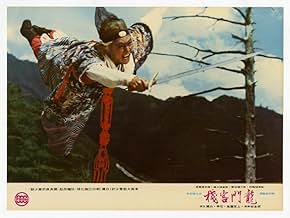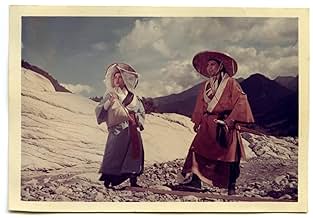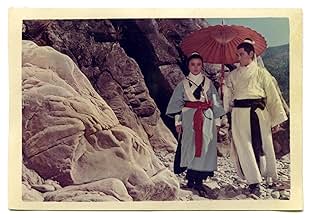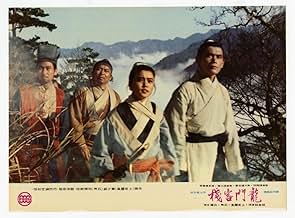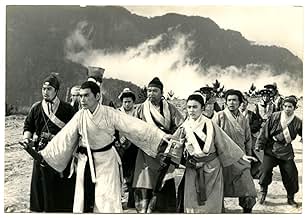When the children of an executed General are pursued in 1457 China, some heroic martial arts swordsmen intervene.When the children of an executed General are pursued in 1457 China, some heroic martial arts swordsmen intervene.When the children of an executed General are pursued in 1457 China, some heroic martial arts swordsmen intervene.
- Awards
- 1 win & 1 nomination total
- Director
- Writer
- All cast & crew
- Production, box office & more at IMDbPro
Featured reviews
10Deusvolt
I saw this during its initial run under the title "Dragon Inn."
This is no ordinary swordplay movie. It is a visual treat of ancient Chinese costumes and weaponry. The traditional Chinese instruments used for the background music added an otherwordly flavor. I left the theatre wondering if the movie was truly historical.
The head of the Yu clan has been condemned to death by the evil prime minister who has usurped imperial power. A palace eunuch who managed to claw his way to power, he is also reputed to be China's greatest swordsman. He plots to eliminate the entire Yu family but is opposed by a master swordsman and swordswoman.
A memorable scene that has nothing to do with fighting is the dinner at Dragon Inn which introduced me to the Mongolian Fire Pot (shabu-shabu) style of eating. To the uninitiated, there is a fire pot in the middle of the table decked out with all sorts of raw food which you put into the boiling water of the firepot and eat them as they are cooked. The cooking water is sipped as soup.
I took my little sister to see it and from then on she got hooked on Chinese swordplay movies. She began reading up on ancient China and in college she majored in history and archaeology -- all because I took her to see Dragon Inn.
I am gratified to learn recently that the female supporting actress Feng Hsu moved on to become a producer-director herself with a number of critically acclaimed films to her credit. I look forward to seeing them soon.
This is no ordinary swordplay movie. It is a visual treat of ancient Chinese costumes and weaponry. The traditional Chinese instruments used for the background music added an otherwordly flavor. I left the theatre wondering if the movie was truly historical.
The head of the Yu clan has been condemned to death by the evil prime minister who has usurped imperial power. A palace eunuch who managed to claw his way to power, he is also reputed to be China's greatest swordsman. He plots to eliminate the entire Yu family but is opposed by a master swordsman and swordswoman.
A memorable scene that has nothing to do with fighting is the dinner at Dragon Inn which introduced me to the Mongolian Fire Pot (shabu-shabu) style of eating. To the uninitiated, there is a fire pot in the middle of the table decked out with all sorts of raw food which you put into the boiling water of the firepot and eat them as they are cooked. The cooking water is sipped as soup.
I took my little sister to see it and from then on she got hooked on Chinese swordplay movies. She began reading up on ancient China and in college she majored in history and archaeology -- all because I took her to see Dragon Inn.
I am gratified to learn recently that the female supporting actress Feng Hsu moved on to become a producer-director herself with a number of critically acclaimed films to her credit. I look forward to seeing them soon.
I saw this film in the 60's, and have yet to find one to beat it. 'Hidden Dragon, Crouching Tiger' has to come in behind this masterpiece. The use of new actors and actresses, the adoption of well-timed traditional Chinese music, e.g. to usher in the villain, the innovative action sequence in sword fights, all added to the brilliance of this film.
Yes, there are shortcomings. Toward the end, and the climax, the anti-gravity leaps to the trees were overdone and unnecessary. Regardless, this film resembles the best of the traditional, addictive Chinese martial art novels that once consumed many hours of the armchair martial art addicts.
Yes, there are shortcomings. Toward the end, and the climax, the anti-gravity leaps to the trees were overdone and unnecessary. Regardless, this film resembles the best of the traditional, addictive Chinese martial art novels that once consumed many hours of the armchair martial art addicts.
10wataru-7
There are some movies that stick by you over the years and this Chinese swords movie from the middle sixties is one of them.
King Hu's Dragon Gate Inn has all the ingredients in it to make this movie a classic. Not only does it have good swords fights and combines these with an excellent story and plot but on a more subtle level the background music adds a really good atmosphere to it that draws you even more into the movie and story.
I can recommend this movie for anyone who is interested in Chinese film in general and anyone who is interested in Chinese swords movies with a good story and plot.
10 out of 10 points from me.
King Hu's Dragon Gate Inn has all the ingredients in it to make this movie a classic. Not only does it have good swords fights and combines these with an excellent story and plot but on a more subtle level the background music adds a really good atmosphere to it that draws you even more into the movie and story.
I can recommend this movie for anyone who is interested in Chinese film in general and anyone who is interested in Chinese swords movies with a good story and plot.
10 out of 10 points from me.
It's China in the year 1547. A minister has been executed and his two younger children sent into exile ... officially. The Eunuchs in charge and the bad boys of the Eastern Gate intend to kill them at the Dragon Inn on the border. As they move, however, an assortment of skilled swordsmen (and one swordswoman) show up at the Inn...
King Hu's martial arts movie has nasty villains, loner heroes, magnificent wide-screen Eastmancolor images (restored in 2013) and all sorts of crazy fight sequences in a dazzling array. There seem to be a few plot holes (people keep pausing in their fighting to talk), but that may be a matter of the standards of the Taiwanese cinema as opposed to my more western ideas. What strikes me in the storytelling technique is that the film maker seems to have seen and been influenced by the Man With No Name" trilogy, or at least YOJIMBO and SANJURO, drawing the same conclusions about cinema that Leone had. Chun Shin's character enters the Inn and encounters the agents of the Eastern Gate with the same wry, skilled, deadly sense of humor that Eastwood showed in his performances.
I'm not familiar with Taiwanese film-making of this era and genre. My experience has tended toward the Hong Kong offerings, with an emphasis on the Jacky Chan and Stephen Chow comedies. This is a very impressive introduction to the style and to King Hu
King Hu's martial arts movie has nasty villains, loner heroes, magnificent wide-screen Eastmancolor images (restored in 2013) and all sorts of crazy fight sequences in a dazzling array. There seem to be a few plot holes (people keep pausing in their fighting to talk), but that may be a matter of the standards of the Taiwanese cinema as opposed to my more western ideas. What strikes me in the storytelling technique is that the film maker seems to have seen and been influenced by the Man With No Name" trilogy, or at least YOJIMBO and SANJURO, drawing the same conclusions about cinema that Leone had. Chun Shin's character enters the Inn and encounters the agents of the Eastern Gate with the same wry, skilled, deadly sense of humor that Eastwood showed in his performances.
I'm not familiar with Taiwanese film-making of this era and genre. My experience has tended toward the Hong Kong offerings, with an emphasis on the Jacky Chan and Stephen Chow comedies. This is a very impressive introduction to the style and to King Hu
Long considered one of the masterpieces of the wuxia genre King Hu's "Dragon Inn" is a visually superb epic that's closer in tone to Leone than Kurosawa and it features some of the most balletic fight sequences in all of cinema. The plot is virtually irrelevant; there are good guys and there are bad guys and that's really all you need to know while even the comedy works beautifully. The action takes place almost entirely around the inn of the title and the film was further immortalised by Ming-liang Tsai when he chose it to be the film screening in the near empty cinema in "Goodbye, Dragon Inn", (they would make a great double-bill). It's been surpassed in people's affections by King Hu's later "A Touch of Zen" but this is arguably more fun and it established Hu as a force to be reckoned with in international cinema, a genre master as well as a great visual stylist. Wonderful.
Did you know
- TriviaDirector King Hu encouraged his martial arts choreographers to draw from the alternately fluid and rhythmic movements of Chinese opera. Rather than resorting to fast or slow motion, footage printed backward, animation, or other early special-effects techniques, the filmmaker relied as much as possible on the actual skills of his performers and on the magic of editing.
- ConnectionsFeatured in Goodbye, Dragon Inn (2003)
- How long is Dragon Inn?Powered by Alexa
Details
- Release date
- Countries of origin
- Language
- Also known as
- Die Herberge zum Drachentor
- Filming locations
- Production company
- See more company credits at IMDbPro
Contribute to this page
Suggest an edit or add missing content


